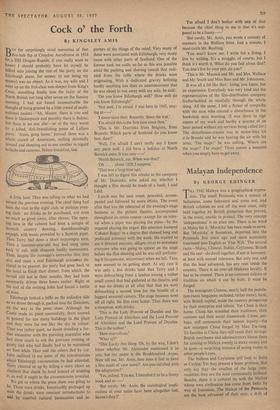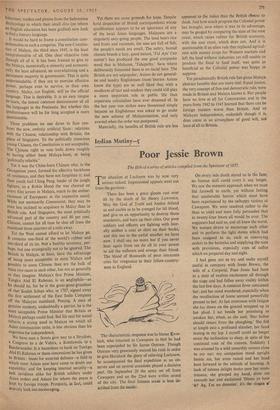Malayan Independence
By GEORGE EDINGER
MILL 1942 Malaya was a geographical expres- sion. The small Peninsula was a mosaic of Sultanates, some federated and some not, and British colonies on and oil the west coast, only held together by British protection that proved, in the event, unable to protect. The very concept 'independence' is an alien one. There is no word in Malay for it. 'Merdeka' has been made to serve. But 'Merdeka' is Sumatran, imported into the Peninsula five years ago and most accurately translated into English as 'Free Will.' The several races—Malay, Chinese, Indian, Ceylonese, British and the rest—do dwell together, if not in harmony, at least with mutual tolerance. But only one, and that the least advanced, has any root inside the country. There is no over-all Malayan loyalty. It has to be created. There is no common culture or tradition on which it can be built. It must be forged.
The immigrant Chinese, nearly half the popula- tion (were Singapore included, rather more), have, with British capital, made the country prosperous by their enterprise and labour. Yet China is their home. China has moulded their traditions, their customs and their social framework. China, per- haps, still commands their inmost loyalty—the new resurgent China forged by Mao Tse-tung. To families in China they still remit their savings. British merchants and administrators blame them for coming to Malaya merely to make money and be gone—a surprising instance of seeing motes in other people's eyes.
The Indians and Ceylonese still look to India or Ceylon. Yet they present a lesser problem. Not only are they the smallest of the large com- munities; they are the least communally inclined.
Besides, there is a cultural tie with the Malays whose own civilisation has come from India by way of Indonesia. The Malays of the Peninsula are the least advanced of their race, a drift of
fishermen, traders and pirates from the Indonesian Archipelago to which their small elite (on whom an English education has been grafted) now look to find a literary language. It would be hard to frame a constitution com- prehensible to such a congeries. The new Constitu- tion of Malaya, the third since 1945, is the least Comprehensible of all. One clear objective runs through all of it. It has been framed to give to the Malays, numerically a minority and economi- cally the least advanced, an overwhelming and a permanent majority in government. That is quite understandable, if they are to exercise effective Power, perhaps even to survive, in their own country. Malay, not English, will be the official language. This is desirable. It is an easy tongue to learn, the lowest common denominator of all the languages in the Peninsula. But whether this predominance will be for long accepted is more questionable.
Three problems no one dares to face con- front the new, entirely artificial State : relations with the Chinese, relationship with Britain, the Place of Singapore. To the politically conscious young Chinese, the Constitution is not acceptable. The Chinese right to vote boils down roughly to having either been Malaya-born, or being politically reliable.'
Yet it was the China-born Chinese who, in the Occupation years, formed the effective backbone of resistance, and they have not forgotten it; and their youth hail Ching Peng, leader of the jungle fighters, as a Robin Hood (he was cheered on every film screen in Malaya, much to the embar- rassment of Europeans in the expensive seats). While not necessarily Communist, they may be even less inclined to acquiesce in Malay than in British rule. And Singapore, the most politically advanced part of the country and 80 per cent. Chinese, cannot for all time be shut off from the mainland three-quarters of a mile away.
Yet the West cannot afford to let Malaya go. It contains one-third of the world's rubber and one-third of its tin. Not a healthy economy, per- haps, but one strategically not to be ignored. The British in Malaya, at least, have the advantage of being more acceptable to most Malays and possibly to some Chinese than are the bulk of these two races to each other, but not so generally as they imagine. Malaya's first Prime Minister, Tungku Abd El Rahman, is an anglophile—as he should be, for he is the great-great-grandson of that Kedah Sultan who, in 1787, signed away the first settlement of the East India Company off the Malayan mainland, Penang. A man of genuine modesty, undoubtedly a patriot, he is the most acceptable Prime Minister that Britain or Malaya perhaps could find. But his zeal for social reform, a crying need in Malaya on which all Asian communities unite, is less obvious than his eagerness for independence.
We have seen a Smuts give way to a Strydom, a Cosgrave to a de Valera, a Kotelawala to a Bandaranaike. It is hazardous to bank on Tunkgu Abd El Rahman or those concessions he has given to Britain : bases for external defence—a field in which most Asians now have come to doubt our capability; and for keeping internal security—a task invidious alike for British soldiers under Asian orders and Asians for whom the peace is kept by foreign troops. Prospects, in fact, could scarcely look less encouraging.
Yet there are some grounds for hope. Despite lurid despatches of British correspondents whose qualification appears to be an ignorance of any of the local Asian languages, Malayans are a singularly easy-going people. The land bears rice and fruits and coconuts, the seas are full of fish, the people's needs are small. The sultry, humid climate breeds a lazy, good nature, 'MI A pa' ('no matter') has produced the one good composite word that is Malayan, `Tidapathy.' Save where deliberately fomented there is no racial hate. The British are not unpopular; Asians do not general- ise and sundry Englishmen (most literate Asians know the type) are so well liked that with a modicum of tact and wisdom they could still play a more important role in public life than expatriate colonialists have ever dreamed of. In the last year two strikes were threatened simply because an Englishman was asked to go under the new scheme of Malayanisation, and only averted when the order was postponed.
Materially, the benefits of British rule are less apparent to the Asian than the British choose to think. Just how much progress the Colonial power has brought, save where it was to its advantage, may be gauged by comparing the state of the west coast, which raises rubber for British economy, with the east coast, which does not. And it is questionable if an alien rule that replaced agricul- ture with money crops for Western markets and left the land without industries yet still unable to produce the food to feed itself, was quite as beneficial as the Colonial power was happy to suppose.
Yet paradoxically British rule has given Malaya abstract benefits that are more real. Equal justice, the very concept of free and democratic rule, were made in Britain and Malaya knows it. Her people have no love at all for Communism and in the years from 1942 to 1945 learned that there can be foreign masters worse than Britain. And so Malayan independence, makeshift though it is, does come in an atmosphere of good will, not least of all to Britain.































 Previous page
Previous page